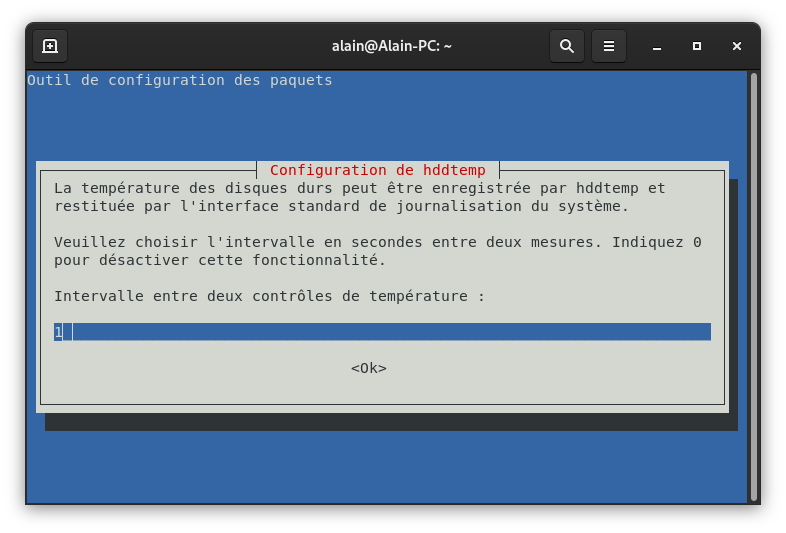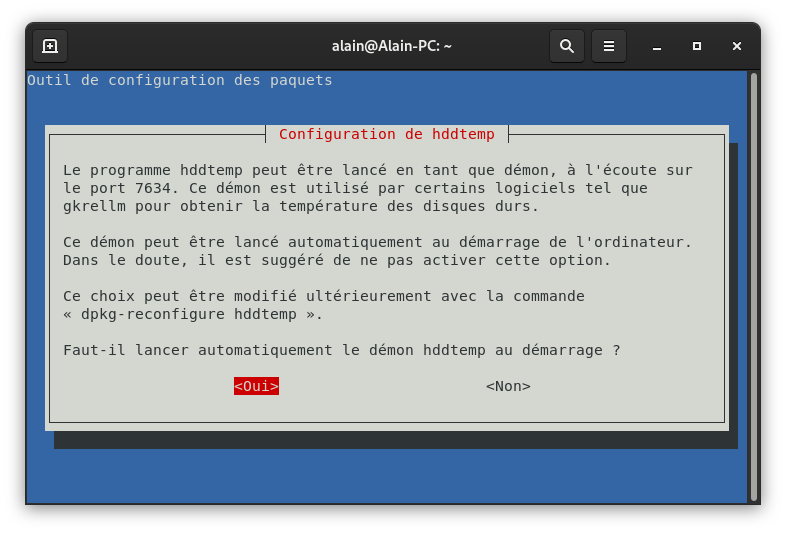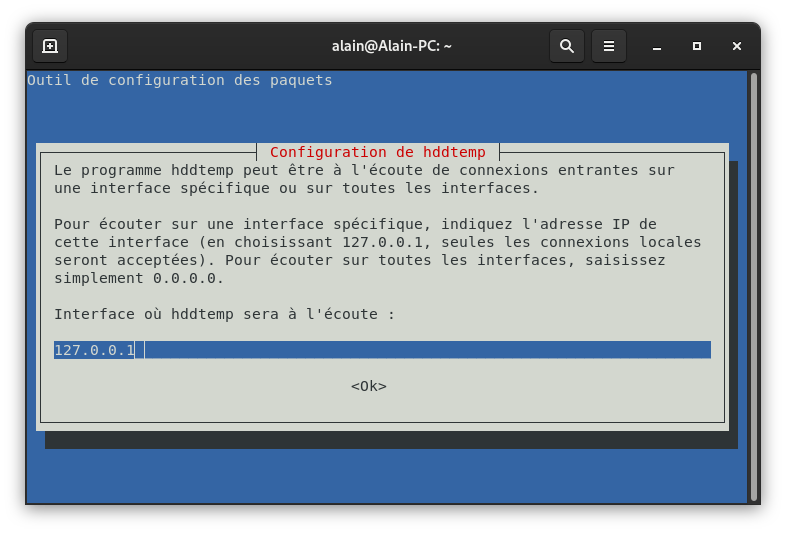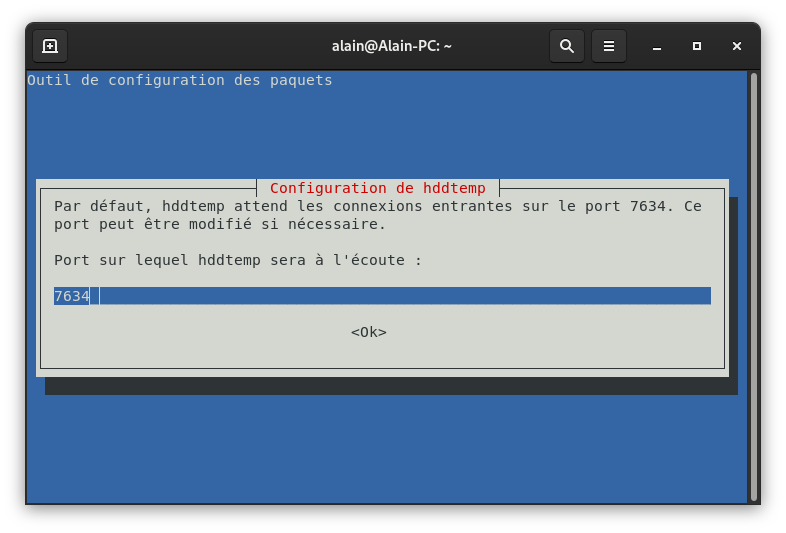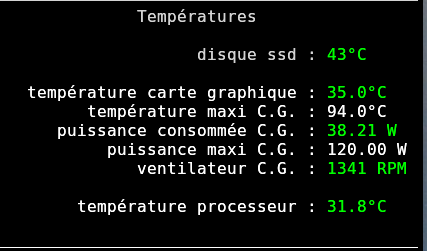Table des matières
hddtemp /dev/disk/by-id/ conky
- Objet : faire fonctionner hddtemp dans conky avec une identification par id
- Niveau requis : débutant avisé
- Commentaires : hddtemp utilise l'identification par sdX , souvent elle est aléatoire . * le but est donc d'utiliser hddtemp avec une identification par id disque

- Débutant, à savoir : Utiliser GNU/Linux en ligne de commande, tout commence là !.

- Suivi :
-
 Pour choisir, voir les autres Tags possibles dans l'Atelier.
Pour choisir, voir les autres Tags possibles dans l'Atelier.
- Création par Debian Alain 23/04/2020
- Testé par <…> le <…>

- Alerte obsolescence : déconseillé à partir de Debian 11 et supprimé à partir de Debian 12 par --gilles-- 19/03/2021
Nota :
echo drivetemp > /etc/modules-load.d/drivetemp.conf
Source : zcat /usr/share/doc/hddtemp/NEWS.Debian.gz le Mar, 02 Fév 2021 ( bullseye )
remplacé par l'usage du paquet lm-sensors
Contributeurs, les  sont là pour vous aider, supprimez-les une fois le problème corrigé ou le champ rempli !
sont là pour vous aider, supprimez-les une fois le problème corrigé ou le champ rempli !
Introduction
hddtemp utilise par défaut le nommage par /dev/sdX.
Ce nommage étant aléatoire, il est possible de le forcer à utiliser le nommage par /dev/disks/by-id/XXXXXX.
En préambule, il faut installer comme suit hddtemp :
apt install hddtemp
Puis le reconfigurer afin qu'il soit lancé au démarrage de notre système et qu'il soit accessible par nos programmes (ici conky) :
dpkg-reconfigure hddtemp
Nous devons ensuite configurer le fichier /etc/default/hddtemp afin de lui dire de lire aussi les disques nommés sous forme la /dev/disk/by-id/XXXXXX.
Pour obtenir la correspondance entre /dev/sdX et /dev/disk/by-id/XXXXXX nous pouvons faire un ls -l dans le dossier /dev/disk/by-id/.
Voici ce que j'obtiens :
ls -lh /dev/disk/by-id/
total 0 lrwxrwxrwx 1 root root 9 avril 23 08:39 ata-CT500MX500SSD4_1813E134D584 -> ../../sdf ... / ... lrwxrwxrwx 1 root root 9 avril 23 08:39 ata-HL-DT-ST_BD-RE_BH10LS38_K9IB9NE1359 -> ../../sr1 lrwxrwxrwx 1 root root 9 avril 23 08:39 ata-HL-DT-ST_BD-RE_BH10LS38_K9IC31M4320 -> ../../sr0 lrwxrwxrwx 1 root root 9 avril 23 08:39 ata-ST2000DL003-9VT166_6YD1QBLS -> ../../sdc ... / ... lrwxrwxrwx 1 root root 9 avril 23 08:39 ata-ST2000DM001-1CH164_Z1E2XAN7 -> ../../sdb ... / ... lrwxrwxrwx 1 root root 9 avril 23 08:39 ata-ST2000DM001-9YN164_Z1E0AC50 -> ../../sda ... / ... lrwxrwxrwx 1 root root 9 avril 23 08:39 ata-ST4000VM000-2AF166_WDH0AFF6 -> ../../sdd ... / ... lrwxrwxrwx 1 root root 9 avril 23 08:39 ata-ST4000VX007-2DT166_ZGY57FLJ -> ../../sde ... / ... lrwxrwxrwx 1 root root 11 avril 23 08:39 md-name-Alain-PC:0 -> ../../md127 lrwxrwxrwx 1 root root 11 avril 23 08:39 md-uuid-4d4f9d9d:b7119121:c474b6d3:f56af7d6 -> ../../md127 lrwxrwxrwx 1 root root 9 avril 23 08:39 wwn-0x5000c5003fa4e30d -> ../../sda ... / ... lrwxrwxrwx 1 root root 9 avril 23 08:39 wwn-0x5000c500465b459f -> ../../sdc ... / ... lrwxrwxrwx 1 root root 9 avril 23 08:39 wwn-0x5000c5004fbead7a -> ../../sdb ... / ... lrwxrwxrwx 1 root root 9 avril 23 08:39 wwn-0x5000c5009ca2e849 -> ../../sdd ... / ... lrwxrwxrwx 1 root root 9 avril 23 08:39 wwn-0x5000c500b67c94c2 -> ../../sde ... / ... lrwxrwxrwx 1 root root 9 avril 23 08:39 wwn-0x500a0751e134d584 -> ../../sdf ... / ...
Nous reportons ainsi la liste des devices qui nous intéresse dans le fichier de configuration d'hddtemp (ligne DISKS)
nano -w /etc/default/hddtemp
#Defaults for hddtemp initscript (/etc/init.d/hddtemp) # This is a POSIX shell fragment # [automatically edited by postinst, do not change line format ] # hddtemp network daemon switch. If set to true, hddtemp will listen # for incoming connections. RUN_DAEMON="true" # List of devices you want to use with hddtemp. If none specified, # hddtemp will probe standard devices. #DISKS="/dev/hda" DISKS="/dev/sd[a-f] /dev/disk/by-id/wwn-0x5000c5003fa4e30d /dev/disk/by-id/wwn-0x5000c5004fbead7a /dev/disk/by-id/wwn-0x5000c500465b459f /dev/disk/by-id/wwn-0x5000c5009ca2e849 /dev/disk/by-id/wwn-0x5000c500b67c94c2 /dev/disk/by-id/wwn-0x500a0751e134d584" # List of devices you want to use with hddtemp, but that would not be # probed for a working sensor. DISKS_NOPROBE="" # IP address of the interface on which you want hddtemp to be bound # on. If none specified, goes to 127.0.0.1. Use 0.0.0.0 to bind hddtemp # on all interfaces. INTERFACE="127.0.0.1" # Port number on which you want hddtemp to listen on. If none specified, # the port 7634 is used. PORT="7634" # Database file to use. If none specified, /etc/hddtemp.db is used. #DATABASE="/etc/hddtemp.db" # Separator to use between fields. The default separator is '|'. #SEPARATOR="|" # Logging period (in seconds) for the temperatures. If set to a value # different than 0, hddtemp will run as a daemon periodically logging # the temperatures through syslog RUN_SYSLOG="1" # Other options to pass to hddtemp OPTIONS=""
Test
Il ne nous reste plus qu'a tester pour voir si hddtemp récupère bien les températures de nos disques.
Exemple avec le disque wwn-0x500a0751e134d584 (sdf) :
alain@Alain-PC:~$ sudo hddtemp /dev/disk/by-id/wwn-0x500a0751e134d584 [sudo] Mot de passe de alain : /dev/disk/by-id/wwn-0x500a0751e134d584: CT500MX500SSD4: 46°C
Nous pouvons alors reporter cette commande dans conky afin de monitorer la température de notre disque :
${alignc} disque ssd : ${hddtemp /dev/disk/by-id/wwn-0x500a0751e134d584}°C
Utilisation
DISKS="/dev/sd[a-f] /dev/disk/by-id/wwn-0x5000c5003fa4e30d /dev/disk/by-id/wwn-0x5000c5004fbead7a /dev/disk/by-id/wwn-0x5000c500465b459f /dev/disk/by-id/wwn-0x5000c5009ca2e849 /dev/disk/by-id/wwn-0x5000c500b67c94c2 /dev/disk/by-id/wwn-0x500a0751e134d584"
Avec la modification ci-dessus du fichier /etc/default/hddtemp, vous avez accès aussi bien à la notation /dev/sdX qu'a la notation /dev/disk/by-id/XXXXX.
Température ssd en couleur
Nous allons créer un script bash afin de récupérer la température d'un disque.
Ce script recevra 2 paramètres :
- le mode d'affichage (conky|shell)
- l'id du disque à monitorer
nano -w ~/bin/show_disk_temperature.sh
- show_ssd.sh
#! /bin/bash # Get temperature value SENSOR_PROBE="/dev/disk/by-id/$2" TEMP_STRING=$(hddtemp "$SENSOR_PROBE" | grep --only-matching '[0-9.]\+°C' | head --lines=1 ) TEMP_NUMBER=${TEMP_STRING%°C} # Set display mode based on arguments # Default is to display temperature in a console DISPLAY_MODE="$1" # Set display color based on temperature value # ≥ 70°C is high, ≥ 80°C is critical if [ $TEMP_NUMBER -ge 60 ]; then case "$DISPLAY_MODE" in ('conky') COLOR='red' ;; ('shell') COLOR=31 ;; esac elif [ $TEMP_NUMBER -ge 50 ]; then case "$DISPLAY_MODE" in ('conky') COLOR='yellow' ;; ('shell') COLOR=33 ;; esac else case "$DISPLAY_MODE" in ('conky') COLOR='green' ;; ('shell') COLOR=32 ;; esac fi # Set message syntax based on display mode case "$DISPLAY_MODE" in ('conky') MESSAGE='${color %s}%s${color}' ;; ('shell') MESSAGE='\033[1;%sm%s\033[0m\n' ;; esac # Print the formatted message printf "$MESSAGE" "$COLOR" "$TEMP_STRING" exit 0
Il faut maintenant le rendre exécutable :
chmod +x ~/bin/show_disk_temperature.sh
Et enfin nous pouvons l'intégrer à notre configuration conky :
$hr
${alignc}Températures
${alignc} disque ssd : ${execpi 5 ~/bin/show_disk_temperature.sh conky wwn-0x500a0751e134d584}
$hr
vous devriez obtenir ceci , par exemple :

